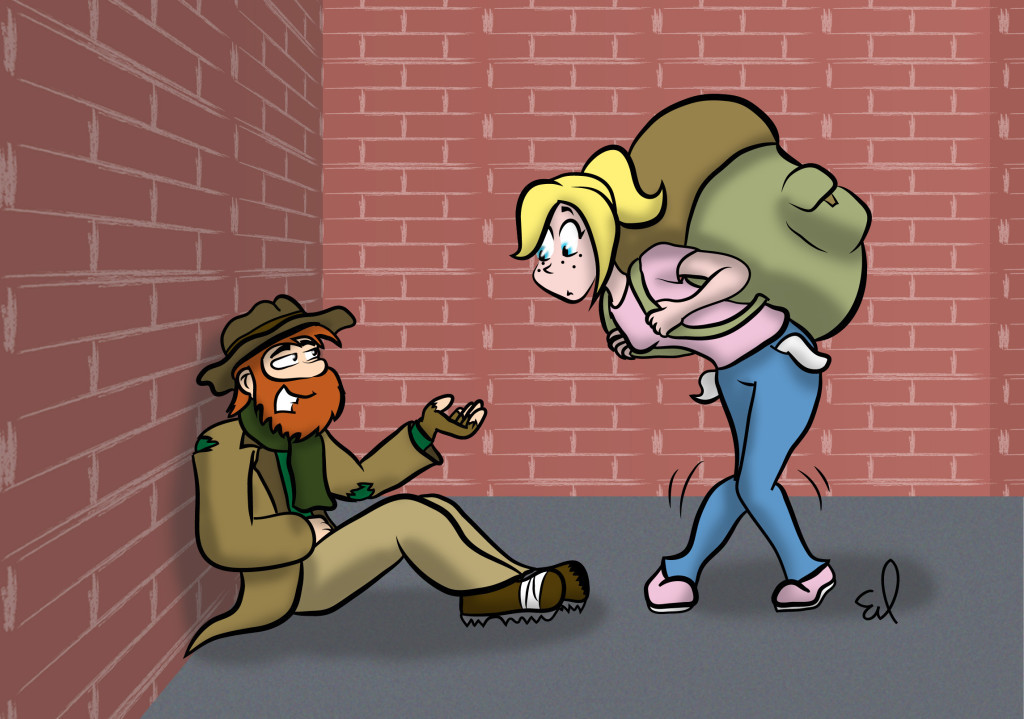Poverty and sparing change in Vancouver
By Natalie Serafini, Assistant Editor
Passing by someone in need is something I do almost daily in Vancouver. Much as it’s become second nature to duck my head down, feign enthrallment in a conversation, or whip out my phone so my disregard is somewhat excusable, my desensitized discomfort will likely never go away.
While my income isn’t boast-worthy, I know that I can spare change—the money that I allot for drinks alone could easily pay for a person’s meal. I have no excuse, especially since I live with my parents and have very few bills to pay. Based on the people I’ve seen who practice the same song and dance of “Oh look, a bird! How conveniently distracting,” I’m probably not alone in my inexcusable excuse.
Ideally, the fact that I can spare some change means that I would. Same goes for everyone else who doesn’t really need that fifth drink at the bar. Easy as it is to pass the buck—and not actually give any bucks—the bleeding heart liberal in me is too idealistic to think that any excuse is really justified, even as I hypocritically latch onto my own.
So, I condemn myself and others for not giving when someone needs to take, and for deliberately turning a blind eye to marginalized members of society. But, if I can shift gears and blame for a moment, maybe our collectively not sparing change isn’t the problem. It compounds the problem, but it’s not the root of the issue.
According to Work BC, unemployment rates between 1995-2008 in the Mainland/Southwest averaged 6.6 per cent. According to CBC, Vancouver’s unemployment rate was at 6.6 per cent again as recently as this past July. Clearly, the stats are showing themselves to be steady.
Granted, the numbers haven’t increased dramatically, and they’re below July’s Canadian unemployment average of 7.2 per cent. Though Christy Clark and the BC Liberals claimed last April that “In the first year of the jobs plan, we led the country in jobs creation,” BC is actually ninth in the country; as the CBC pointed out, Saskatchewan has been leading the country in job growth.
Compounding the problem of unemployment is the issue of low welfare rates. In 2012, the organization Raise the Rates notoriously challenged Surrey NDP politician, Jagrup Brar, to live off $610 for a month—the compensation allotted for a single employable person. Brar’s notes on the experience were predictable: it’s not possible to live in the Lower Mainland off $610/month. Eligibility restrictions and lengthy application procedures also limit who can access social assistance. According to a 2012 article in the Globe and Mail, around one in 25 people receive social assistance in BC, while a CBC article from this year reported that BC currently has the second highest child poverty rate in the country.
Obviously I blame the lack of job growth and inadequate welfare assistance for the unchanging poverty. Returning to my guilt, though, the blame can’t lay completely on any one group’s shoulders. (So, I can’t completely blame the BC Liberals, or any other government that hasn’t significantly improved the job climate since the ‘90s).
That thing, where I turn a blind eye and don’t spare change for someone in the streets? Yeah, I can’t say that I turn away and go straight to lobbying for welfare change so more people have access to benefits. There’s nothing really wrong with my not flinging change around. The fact that we collectively, as a society, persist in turning a blind eye when we could push for change? That’s the real issue.



